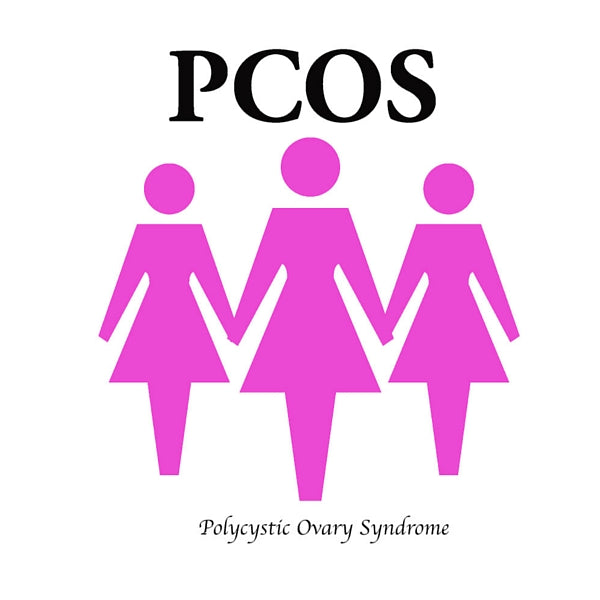What is PCOS?
PCOS is a “syndrome” – in medical language that means it is a condition characterized by a group of symptoms, not all of which are necessary for diagnosis. To be diagnosed with PCOS, based on the Rotterdam criteria, you must have two of the following:
- Infrequent or no ovulation (irregular or long menstrual cycles or no menstrual periods)
- Signs or symptoms (or laboratory testing) showing high androgens (testosterone or dihydrotestosterone) – these include acne, abnormal hair growth, hair loss, darkening skin at skin folds
- Polycystic ovaries on ultrasound
As you see it is possible to have PCOS and not have polycystic ovaries! It is a syndrome that results from hormone imbalances in the body – hormones that directly impact the ovaries and ovulation.
Causes of Polycystic Ovarian Syndrome
What causes the hormone imbalance that leads to the symptoms associated with polycystic ovarian syndrome? We don’t have a clear answer to that for every woman. There are some risk factors associated with developing PCOS, but women with no risk factors can still develop this syndrome.
Risk Factors for PCOS
- Genetics
- Family history of diabetes
- Obesity
- Insulin resistance
- High blood sugar
- Low blood sugar
- Use of seizure medication (valproate)
Hormones and Polycystic Ovarian Syndrome
There are a vast number of hormonal imbalances that are intricately intertwined in PCOS. A brief summary is given below.
- Testosterone and dihydrotestosterone (DHT) – levels of free and total testosterone are often elevated. Production of androgens (male hormones) in the ovaries is increased in PCOS. The increased levels of testosterone and DHT lead to the characteristic acne or abnormal hair growth associated with PCOS.
- Luteinizing hormone (LH) – increased LH is characteristic of PCOS. The diagnosis of PCOS is often identified when the LH:FSH ratio is greater than 2:1.
- Follicle stimulating hormone (FSH) – can be low or normal. The lack of ovulation that occurs in PCOS is partially due to the lack of follicle response to FSH.
- Sex hormone binding globulin (SHBG) – levels are decreased. SHBG binds to testosterone and DHT, rendering them biologically unavailable. With low levels of SHBG, increased action of testosterone is seen in tissues (resulting in hair loss, abnormal hair growth, and acne).
-
Insulin – high levels of insulin, or resistance to insulin in the tissues, is thought to be a primary cause of PCOS. Many doctors think that insulin imbalances are the first step in the cascade of hormone imbalances that occur in PCOS.
Symptoms of PCOS
The symptoms of PCOS occur as a result of the hormonal imbalances at the root of this condition. Your symptoms can help guide an experienced clinician to identify the dominant imbalances resulting in your PCOS.
Common symptoms of PCOS:
- Obesity and weight management issues (only in 40-50% of PCOS sufferers)
- Acne (typically along the chin and around the mouth)
- Oily skin
- Polycystic or enlarged ovaries (found on ultrasound)
- Blood sugar imbalances (“hangry”, dizziness, lightheadedness)
- Darkening of skin at skin folds (acanthosis nigricans)
- Long or irregular menstrual cycles (due to lack of ovulation)
Naturopathic Management of PCOS
Naturopathic medicine has great potential in the treatment of polycystic ovarian syndrome because it focuses on individualized care. There is no “standard” protocol for PCOS, your ND will need to discuss your symptoms and recognize your state of hormonal imbalance to develop an effective treatment plan.
Your naturopath may order additional laboratory testing if the underlying hormonal imbalances are not clear. Testing may include salivary, urine or blood tests, depending on which hormone is being assessed. You may be asked to keep a record of your basal body temperature (BBT), a simple means of tracking the hormonal ebb and flow of your monthly cycle.
The cornerstone of treatment for PCOS is improving response of the body to insulin. This often involves exercise and consuming a whole foods diet that is low in refined and processed sugars. Botanical medicines and nutritional supplements may also be used to address specific hormone imbalances to improve PCOS symptoms and its underlining causes.
Beyond Understanding
At this point you have an understanding of the symptoms and hormonal imbalances associated with PCOS. If you are ready to start working on achieving your healthy balance, Dr. Santos is currently accepting new patients at NatCan Integrative Medical & Wellness Centre. Contact her for a complimentary meet and greet appointment, or book your initial appointment today.


